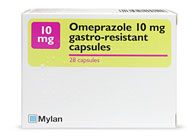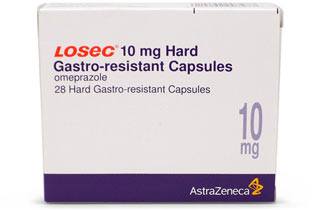Omeprazole
Omeprazole suppresses the symptoms of acid reflux for around 24 hours. Available to buy online in 10mg or 20mg capsules from Dr Fox.
Omeprazole rated 4.86/5 in 49 reviews
Start orderBuy omeprazole online in UK
How to order omeprazole 10mg/20mg online for UK delivery:
- Read medical information about acid reflux treatment
- Answer medical questions to check for eligibility
- Order reviewed by doctors - medication posted from UK pharmacy (Royal Mail Tracked 24)
Prices
| Medication | Quantity | Cost |
|---|---|---|
| Omeprazole 10mg (generic) | 28 capsules | £7.95 |
| Omeprazole 10mg (generic) | 56 capsules | £11.95 |
| Omeprazole 20mg (generic Losec) | 28 capsules | £9.00 |
| Losec (omeprazole) 10mg | 28 capsules | £14.50 |
| Losec (omeprazole) 10mg | 56 capsules | £26.10 |
| Losec (omeprazole) 20mg | 28 capsules | £22.80 |
Price match guarantee
Prescription issued online - small prescription fee per order.
Prescription fees
Dr Fox supplies medicine on prescription and charges a small prescription fee based on the order value of each prescription.
Prescriptions are issued by our doctors online and sent electronically to our pharmacy.
| Order value | Prescription fee |
|---|---|
| up to £10 | £1.00 |
| up to £20 | £2.00 |
| up to £40 | £3.00 |
| over £40 | £4.00 |
If you have your own private paper prescription please post to our pharmacy (details).
Dr Fox prices are 25%–50% lower than other UK online clinics.
Delivery charges
UK delivery only: £2.90 per consultation via Royal Mail Tracked 24 Signed For (1-3 working days with tracking).
Parcel forwarding services are not permitted. Use only UK home or work delivery address.
Returns and refunds - unwanted items can be returned within 14 working days for a full refund.
About omeprazole
- Omeprazole treats the symptoms of acid reflux, gastro-oesophageal reflux disease (GORD), and dyspepsia/indigestion.
- Take 10mg-20 mg capsules daily for up to 4 weeks.
- Can take 1-2 days for symptoms to settle.
- Read the patient leaflet for a full list of side effects, cautions, and interactions with other drugs.
Omeprazole is a type of medicine called a proton pump inhibitor (PPI). PPIs have been in use for more than 30 years, and have been shown to be safe and effective treatments for acid reflux/heartburn, and a range of other gastric and duodenal conditions, including dyspepsia.
In a 2017 review, the authors concluded that all currently available PPIs are effective, and there are only small pharmacological differences in their use.
Further information: NHS - Omeprazole.
Generic omeprazole

Losec is a brand name for a medicine called omeprazole, the active ingredient.
Lower cost generic omeprazole is also available. Generic medicines work in the same way and contain the same quantity of the active ingredient but are usually lower cost than brand-name medicines.
Some preparations of omeprazole are available over the counter, without a prescription.
How does omeprazole relieve acid indigestion symptoms?
The cells which line your stomach, produce acid, using a specific biochemical process known as a 'proton pump'. Omeprazole stops the biological action of these pumps - and hence it is called a 'proton pump inhibitor' (PPI). These pumps are only active in response to a meal, so omeprazole is most effective when taken within an hour of a meal. Symptoms such as acid reflux, heartburn, GORD, and dyspepsia are reduced by the PPI, because the stomach contents become less acidic.
Omeprazole is also effective, when combined with specific antibiotics, in treating H. Pylori. This is a bacterium sometimes found in the stomach, and associated with the development of gastritis, gastric and duodenal ulcers, and gastric cancer.
How to take omeprazole
- Take one 10mg capsule once or twice a day, or take one 20mg capsule once a day.
- Initially, one capsule in the morning, preferably an hour before food if possible.
- Swallow capsules whole, with a glass of water. They should not be chewed or crushed.
- If you have trouble swallowing, open the capsule and stir the contents into a small glass of non-carbonated water, or fruit juice. Then drink the entire contents of the glass within 30 minutes.
- An initial course is up to 4 weeks treatment.
Who might be suitable for omeprazole?
Omeprazole is licensed to treat adults, aged over 18, with:
- Reflux oesophagitis, treatment and prevention - commonly known as acid reflux/heartburn.
- Gastro-oesophageal reflux disease (GORD/GERD).
- Duodenal and gastric ulcers, treatment and prevention.
- Zollinger Ellison Syndrome.
- H. Pylori infection.
NICE also recommends that omeprazole can be used to treat dyspepsia, but this is an off-label use.
How soon is omeprazole effective?
It may take 1-2 days to notice an effect from omeprazole. For best results follow the instructions carefully on how to take it - see above or read the patient leaflet supplied in packs.
Consult a GP if symptoms have not significantly settled after 2 weeks.
Who is not suitable for omeprazole?
The manufacturer recommends monitoring with your GP if you are already taking phenytoin or warfarin type anticoagulants (requiring regular blood tests).
If taking medication to treat HIV/AIDS or cancer chemotherapy, including high dose methotrexate, you should not take omeprazole without discussing with your specialist. Omeprazole may make your treatment less effective.
There are checks in the online consultation to confirm if omeprazole is suitable or may affect other medications taken.
During treatment with omeprazole, if new symptoms develop such as unintended weight loss, vomiting, blood in the vomit, or dark, tarry stools, or persistent diarrhoea you must seek urgent medical attention.
Any special warnings/precautions for use?
Losec contains lactose. Most generic brands of omeprazole contain sucrose. Please message Dr Fox when ordering if you prefer lactose-free medication.
The following have been reported with long-term (over a year) regular use of omeprazole:
- Slight increase in the risk of fractures at the hip, wrist, and spine, hence patients are recommended to follow national guidelines for prevention and treatment of osteoporosis, and to have an adequate intake of calcium and vitamin D.
- Reduced absorption of vitamin B12 if taking regularly for more than 2-3 years.
- Low magnesium levels. Symptoms include fatigue, dizziness, delirium, convulsions and cardiac arrhythmias. More likely if taken with other drugs (e.g. digoxin) which can also lower magnesium levels. Periodic checks of blood magnesium levels may be recommended if taking for longer than 3 months continuously.
- A rare condition 'subacute cutaneous lupus erythematosus' (SCLE). Consult your GP promptly if you develop a skin rash on sunlight exposed areas.
- A slightly higher risk of gastroenteritis such as Campylobacter and Salmonella.
- Possible dizziness, visual disturbances, and muscular weakness - if affected do not drive or operate heavy machinery.
If undergoing investigations or blood tests, inform the doctor or nurse that you are taking omeprazole. You may have to stop it for a few weeks, to prevent it interfering with the results or from hiding serious conditions if you are having an endoscopy.
Is omeprazole safe in pregnancy and/or breastfeeding?
You must discuss this with your doctor as no medication should be taken in pregnancy unless absolutely necessary. However, no adverse effects have been noted, and omeprazole may be taken in pregnancy and breastfeeding if you are advised to do so.
See also Best use of medicines in pregnancy - omeprazole.
Can taking omeprazole cause an allergic emergency?
Very rarely omeprazole and other PPIs can trigger an allergic reaction. The allergy is often shared with other PPIs so do not take omeprazole if you have previously experienced an allergic reaction to a PPI.
If you have any symptoms or signs suggestive of an acute allergic reaction (anaphylaxis), you must get medical help immediately (telephone 999 if in the UK).
Symptoms/signs of an acute allergic reaction include:
- Difficulty breathing, tight chest, wheezing
- Swelling of the face, lips, or tongue
- Skin rash – urticaria/hives
- Confusion/collapse/unconsciousness
For more information see NHS - Anaphylaxis.
Possible side effects of omeprazole
All medications have the potential to cause side effects but not everyone gets them.
The most common side effects reported with omeprazole (up to 1 in 10 users) include:
- Headache
- Constipation or diarrhoea
- Flatulence
- Nausea/vomiting
- Stomach pains
Sometimes small benign (non-cancerous) polyps can develop in the stomach. These are generally only noticed on endoscopy and disappear on stopping the medication.
Further information is in the manufacturer's patient leaflet.
Are there any drugs which might interact with omeprazole?
Omeprazole may lead to a decrease or an increase in the levels of certain drugs in your blood stream.
Omeprazole may lead to a decrease in drug levels in your blood stream of:
- Clopidogrel - to prevent blood clots.
- Dasatinib, gefitinib, neratinib, erlotinib - cancer chemotherapy.
- Nelfinavir, rilpivirine, and atazanavir - for HIV.
Omeprazole may lead to an increase in drug levels in your blood stream of:
- Cilostazol - for poor blood supply to legs.
- Citalopram, escitalopram - for depression.
- Diazepam - for anxiety, muscle relaxant or epilepsy.
- Digoxin - for heart disease.
- Methotrexate - a chemotherapy drug.
- Saquinavir and ritonavir - for HIV.
- Tacrolimus - used in organ transplant.
Some drugs may lead to a decrease or an increase of omeprazole in the blood stream.
Drugs which may decrease omeprazole levels:
- Rifampicin - an anti-TB drug
- St John's Wort - a herbal remedy for low mood
- Tipranivir - for HIV.
Drugs which may increase omeprazole levels:
- Clarithromycin - antibiotic.
- Voriconazole - antifungal.
Patient Information Leaflet
The Patient Information Leaflet (PIL) is the leaflet included in the pack with a medicine and must be read before taking the medicine. It is written for patients and gives information about taking or using a medicine.
Omeprazole FAQs
Does Losec/omeprazole contain lactose?
Losec capsules and some generic omeprazole capsules contain lactose. Please contact us if you wish to receive lactose-free omeprazole tablets.
Can I take omeprazole together with another PPI for a better result?
No. You should not take more than one PPI at the same time. If your symptoms are not controlled with a standard dose of one PPI then consult your GP as you may need further tests.
Can I open omeprazole capsules and swallow the contents?
Yes. The capsule contents from Losec or omeprazole can be stirred into half a glass of non-fizzy water or fruit juice, stirred, and drunk immediately. A further half glass of water should then be used to rinse the glass and then drunk. In no instance should the capsules or capsule contents be chewed or crushed.
See also acid reflux FAQs page.

Authored 18 January 2019 by Dr Tony Steele
MB ChB Sheffield University 1983. Former hospital doctor and GP. GMC no. 2825328
Reviewed by Dr C. Pugh, Dr B. Babor, Dr A. Wood
Last reviewed 20 December 2023
Last updated 26 April 2024
Editorial policy
References
- AstraZeneca, 2023, Losec Capsules: Summary of Product Characteristics, accessed 20 December 2023
- Strand, Kim, Peura, 2016, Gut Liver: 25 Years of Proton Pump Inhibitors: A Comprehensive Review, accessed 20 December 2023
Recent Omeprazole reviews
Omeprazole rated 4.86/5 in 49 product reviews
See over 40,000 service reviews of Dr Fox
Omeprazole 10 mg - as described
05 April 2024
Anonymous
Verified
Always work's especially over eating
07 February 2024
P. Dreczkowski
Verified
Fast delivery easy ordering
06 November 2023
Anonymous
Verified
Work superbly
28 October 2023
Anonymous
Verified
10mg is just enough to keep my GERD at bay for 24 hours
12 October 2023
G. Hubball
Verified
The order process
Choose medication, register, and pay
Dr Fox issues prescription online
Pharmacy team post medication direct






